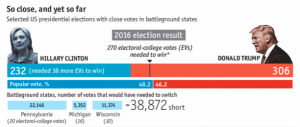Are we happy with our voting system?
Chapter 10 focussed on the U.S. voting system and its role in campaigns and elections. As stated in the reading, elections are the chief means by which citizens selected elected officials, who in turn run the government. However, an important question to ask yourself is: Can elections actually ensure that elected officials do what the people want? Is the election process really truly democratic?
For years voters have had issues with the electoral college. In recent years this concern has grown especially after the 2016 presidential election, when Donald Trump became the U.S. president without winning the popular vote. Before Trump, only four other presidents had achieved that in U.S. history. Throughout President Trump’s campaign he made a tremendous amount of bold statements and promises. While many were reluctant to believe these promises, others were moved by them. His anti-elite and economic populism message resonated with voters in working class counties in Rust Belt states and in turn swayed them to vote for him. By gaining more votes in certain rural and small city areas, Donald Trump won the majority of electoral votes making him the president. Although Hillary Clinton gained the popular vote with 48.2% (to Trump’s 46.2%), without the majority of the electoral votes she could not secure her spot as president. This brings about many controversies with the U.S. voting system.
Firstly, as I had just stated, it allows a candidate win the race without winning the popular vote, which is extremely concerning. Furthermore, the system promotes the candidate to strongly focus on swing states and simply brush aside states that they deem as either 100% republican or 100% democrat, which is unethical. Also this system distorts the one-person, one-vote principle of democracy, as electoral votes are not distributed according to population, but instead each member it has delegated to the House of Representatives and two bonus electors representing its Senators. This therefore causes significant overrepresentation in much smaller states, such as Wyoming vs. California. Also, this system could allow for a tie vote, which almost happened in the race between Obama and Romney. Lastly, because of this system it is extremely difficult for third parties to win elections and almost impossible for them to win the presidency. How is that democratic?
It is understood that our system is very much the best case scenario that we have; however, should we simply settle? With all of these known faults and imperfections that cause such drastic decisions and upset, how can we move along as a country in an effective and cohesive manner? In my opinion, there must be more discussion around this issue and a better understanding as a country as a whole as to why people with no political experience can be elected into office over someone with decades of experience, without even winning the popular vote.
https://www.economist.com/blogs/graphicdetail/2016/12/daily-chart-0
https://www.washingtonpost.com/news/monkey-cage/wp/2016/11/15/should-the-u-s-keep-or-get-rid-of-the-electoral-college/?utm_term=.07d41f20f755
